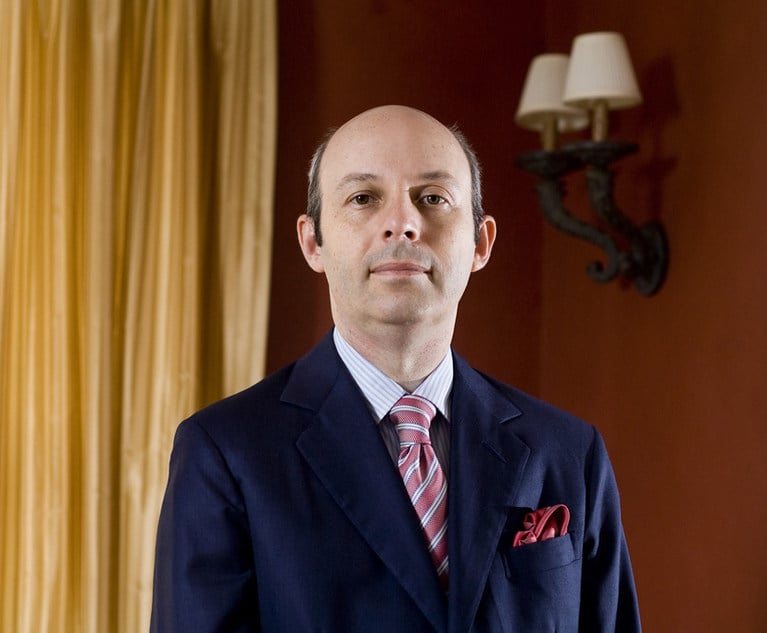Turkish Gold Trader Begins Testimony for Feds in Sanctions-Busting Trial
Reza Zarrab explained the terms of his guilty plea to prosecutors as well as a complex scheme to convert Iranian oil and gas revenues through various bank transfers and gold sales.
November 29, 2017 at 06:19 PM
4 minute read

Reza Zarrab, a gold trader who pleaded guilty to taking part in a scheme to help steer Iranian cash around U.S. sanctions, took his turn as star witness on Wednesday in the trial for his co-defendant, a Turkish banking executive, in a case that has heightened tensions between the U.S. and Turkish governments.
Speaking through Turkish-language interpreters, Zarrab, 34, who said on the stand that he has citizenships for Turkey, Iran and Macedonia, explained the terms of his guilty plea to prosecutors as well as a complex scheme to convert Iranian oil and gas revenues through various bank transfers and gold sales.
“Cooperation was the fastest way to accept responsibility and to get out of jail at once,” Zarrab said, responding to questions from Assistant U.S. Attorney Sidhardha Kamaraju.
As part of an agreement with the government, Zarrab pleaded guilty to seven counts, including conspiracy to defraud the United States, conspiracy to violate the International Emergency Economic Powers Act, bank fraud, conspiracy to commit bank fraud, money laundering and a related conspiracy charge.
He also pleaded guilty to conspiracy to commit bribery and to possessing contraband at a federal detention center in July for allegedly, while he was in federal lockup, bribing a corrections officer to smuggle in alcohol and to use a cellphone.
Standing trial is Mehmet Atilla, 47, accused of conspiracy to violate the IEEPA and conspiracy to commit bank fraud. He is the former deputy CEO for Halkbank, a Turkish state-owned bank.
During his testimony, Zarrab, who appeared in court in khaki-colored jail scrubs, pointed at Atilla in court and said that the defendant helped develop the methods used to filter Iranian oil and gas revenues through Halkbank.
Zarrab also said he paid bribes to former Turkish Economic Minister Mehmet Zafer Çağlayan of at least 40 million euro and $7 million, as well as in Turkish lira.
In September, Manhattan prosecutors charged Çağlayan with bribery.
Using a marker and placard, Zarrab demonstrated how Iranian money was transferred between different accounts at Halkbank then to another Turkish bank that would convert the money to gold, which would then be transferred to Zarrab's company in suitcases and later sold to pay off Iran's debts around the world.
Zarrab told U.S. District Judge Richard Berman of the Southern District of New York that the byzantine system used in the scheme to free up the funds required a minimum of 10 transactions.
In addition to Kamaraju, the prosecution team on the case includes Assistant U.S. Attorneys David Denton and Michael Lockard; and Special Assistant U.S. Attorney Dean Sovolos.
The prosecution will continue to question Zarrab on Thursday and his testimony is expected to last a few days.
Atilla's defense team includes Herrick Feinstein partner Victor Rocco and Cathy Fleming and Robert Fettweis of Fleming.Ruvoldt. Fleming declined to comment on Zarrab's testimony.
The case has made headlines in the U.S. and Turkey as officials on both sides have taken verbal jabs at each other since Zarrab's 2016 arrest at the Disney World theme park, where he was vacationing with his wife, Turkish pop star Ebru Gündeş, and daughter.
At one point in the case, Zarrab brought in former New York City Mayor Rudolph Giuliani, a shareholder with Greenberg Traurig; and former U.S. Attorney General Michael Mukasey, who is of counsel to Greenberg Traurig, to his defense team.
According to court documents, they met with President Recep Tayyip Erdogan, who has ties with Zarrab, about a possible diplomatic resolution to the case. During his testimony on Wednesday, Zarrab said members of his defense team discussed a possible prisoner transfer with Turkey, but did not name which attorneys took part in the talks.
This content has been archived. It is available through our partners, LexisNexis® and Bloomberg Law.
To view this content, please continue to their sites.
Not a Lexis Subscriber?
Subscribe Now
Not a Bloomberg Law Subscriber?
Subscribe Now
NOT FOR REPRINT
© 2025 ALM Global, LLC, All Rights Reserved. Request academic re-use from www.copyright.com. All other uses, submit a request to [email protected]. For more information visit Asset & Logo Licensing.
You Might Like
View All
Decision of the Day: JFK to Paris Stowaway's Bail Revocation Explained

The Crisis of Incarcerated Transgender People: A Call to Action for the Judiciary, Prosecutors, and Defense Counsel
5 minute read
Relaxing Penalties on Discovery Noncompliance Allows Criminal Cases to Get Decided on Merit
5 minute read
SCOTUSblog Co-Founder Tom Goldstein Misused Law Firm Funds, According to Federal Indictment
2 minute readTrending Stories
- 1Midsize Firm Bressler Amery Absorbs Austin Boutique, Gaining Four Lawyers
- 2Bill Would Allow Californians to Sue Big Oil for Climate-Linked Wildfires, Floods
- 3LinkedIn Suit Says Millions of Profiles Scraped by Singapore Firm’s Fake Accounts
- 4Supreme Court Agrees to Hear Lawsuit Over FBI Raid at Wrong House
- 5What It Takes to Connect With Millennial Jurors
Who Got The Work
J. Brugh Lower of Gibbons has entered an appearance for industrial equipment supplier Devco Corporation in a pending trademark infringement lawsuit. The suit, accusing the defendant of selling knock-off Graco products, was filed Dec. 18 in New Jersey District Court by Rivkin Radler on behalf of Graco Inc. and Graco Minnesota. The case, assigned to U.S. District Judge Zahid N. Quraishi, is 3:24-cv-11294, Graco Inc. et al v. Devco Corporation.
Who Got The Work
Rebecca Maller-Stein and Kent A. Yalowitz of Arnold & Porter Kaye Scholer have entered their appearances for Hanaco Venture Capital and its executives, Lior Prosor and David Frankel, in a pending securities lawsuit. The action, filed on Dec. 24 in New York Southern District Court by Zell, Aron & Co. on behalf of Goldeneye Advisors, accuses the defendants of negligently and fraudulently managing the plaintiff's $1 million investment. The case, assigned to U.S. District Judge Vernon S. Broderick, is 1:24-cv-09918, Goldeneye Advisors, LLC v. Hanaco Venture Capital, Ltd. et al.
Who Got The Work
Attorneys from A&O Shearman has stepped in as defense counsel for Toronto-Dominion Bank and other defendants in a pending securities class action. The suit, filed Dec. 11 in New York Southern District Court by Bleichmar Fonti & Auld, accuses the defendants of concealing the bank's 'pervasive' deficiencies in regards to its compliance with the Bank Secrecy Act and the quality of its anti-money laundering controls. The case, assigned to U.S. District Judge Arun Subramanian, is 1:24-cv-09445, Gonzalez v. The Toronto-Dominion Bank et al.
Who Got The Work
Crown Castle International, a Pennsylvania company providing shared communications infrastructure, has turned to Luke D. Wolf of Gordon Rees Scully Mansukhani to fend off a pending breach-of-contract lawsuit. The court action, filed Nov. 25 in Michigan Eastern District Court by Hooper Hathaway PC on behalf of The Town Residences LLC, accuses Crown Castle of failing to transfer approximately $30,000 in utility payments from T-Mobile in breach of a roof-top lease and assignment agreement. The case, assigned to U.S. District Judge Susan K. Declercq, is 2:24-cv-13131, The Town Residences LLC v. T-Mobile US, Inc. et al.
Who Got The Work
Wilfred P. Coronato and Daniel M. Schwartz of McCarter & English have stepped in as defense counsel to Electrolux Home Products Inc. in a pending product liability lawsuit. The court action, filed Nov. 26 in New York Eastern District Court by Poulos Lopiccolo PC and Nagel Rice LLP on behalf of David Stern, alleges that the defendant's refrigerators’ drawers and shelving repeatedly break and fall apart within months after purchase. The case, assigned to U.S. District Judge Joan M. Azrack, is 2:24-cv-08204, Stern v. Electrolux Home Products, Inc.
Featured Firms
Law Offices of Gary Martin Hays & Associates, P.C.
(470) 294-1674
Law Offices of Mark E. Salomone
(857) 444-6468
Smith & Hassler
(713) 739-1250






